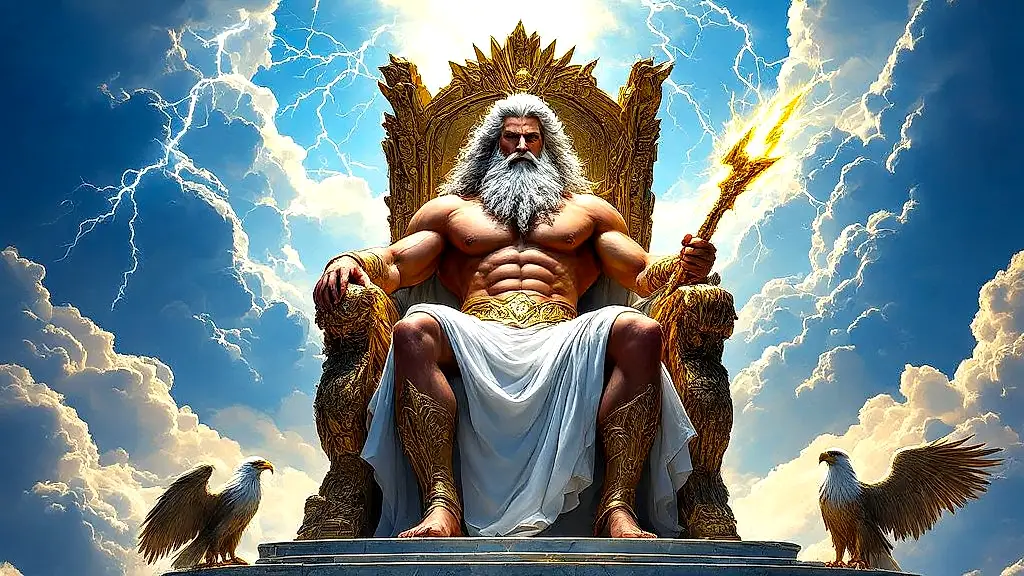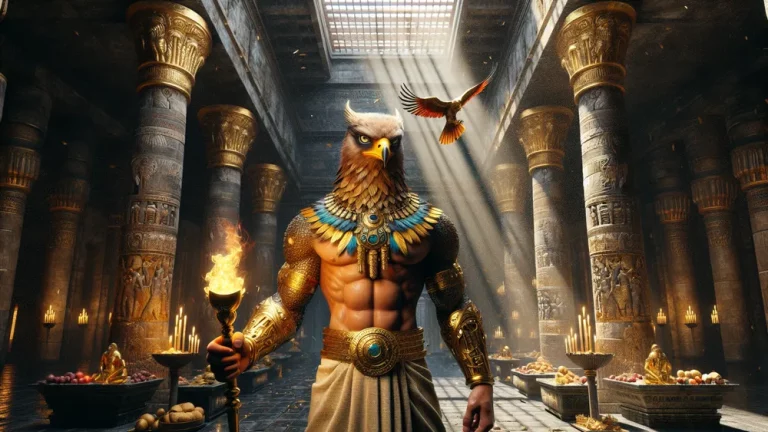Zeus: The Most Powerful God In Greek Mythology And His Rule
Most people know Zeus, the Greek god who controlled thunder. But his rule involved more than just storms. As the most important figure in Greek mythology, Zeus influenced the entire universe. He overthrew the Titans, who ruled before him, and maintained divine order. You could compare him to a cosmic CEO. Even other gods followed his orders, but they didn’t always like it. But his power had limits.
Key Points:
- Zeus became king by tricking his dad Cronus, freeing his siblings, and winning a big war against the Titans.
- He split the world with his brothers—sky for himself, sea for Poseidon, and the underworld for Hades.
- Even though he was the strongest, Zeus had to listen to the Fates and couldn’t change prophecies.
- His lightning bolt, eagle, and oak tree were his main symbols, and people heard his voice in thunder.
- Zeus fought giants in another huge battle and needed human help to win, proving he wasn’t all-powerful.
- He punished Prometheus harshly for giving fire to humans but later made deals when it helped him.
- People worshipped Zeus in different ways across Greece, building huge temples and praying to him for protection and justice.
Ancient writings, like Hesiod’s Theogony, show that Zeus relied on prophecies. He also struggled against older forces, such as Nyx, the goddess of night. Here, we’ll look at how Zeus came to power, how he kept it, and why his stories still matter today.
Whether you’re learning about mythology for the first time or revisiting it, you’ll see there’s more to Zeus than just lightning and thunder.
Most Powerful God In Greek Mythology: Overview and Key Facts
| Aspect | Description | Example/Source |
|---|---|---|
| Name and Title | Zeus (Ζεύς), whose name comes from the ancient term Dyeus, meaning “sky father.” He was called “Father of Gods and Men” and “Cloud-Gatherer” in Greek texts. | Theogony (Hesiod), Iliad (Homer) |
| Domain | He ruled over the sky, weather, law, and the balance of the universe. He commanded storms, and his thunderbolt was his most famous symbol. He also enforced oaths, called horkios in Greek. | Dodona Oracle rituals (Description of Greece, Pausanias) |
| Sacred Symbols | His thunderbolt was made by the Cyclopes. Other symbols included the eagle, which carried his messages, the oak tree linked to oracles, and the aegis, a protective goat-skin shield. | Bibliotheca (Pseudo-Apollodorus) |
| Major Stories | He defeated the Titans in the Titanomachy. He punished Prometheus for giving fire to humans. In another myth, he flooded the world, sparing only Deucalion. Later sections explain these in detail. | Theogony, Prometheus Bound (Aeschylus) |
| Family | He was married to Hera, but he was also known for his many affairs. His brothers were Poseidon (god of the sea) and Hades (ruler of the Underworld). His children included Athena, Apollo, and Heracles. | Homeric Hymns, Bibliotheca |
| Limits to Power | Even Zeus had to obey the Fates, known as the Moirai. He couldn’t change prophecies, like the death of Achilles. He also avoided crossing Nyx, the ancient goddess of night. | Iliad Book 8, Theogony Line 224 |
| Worship | People honored him at major sites like Olympia (home of the Olympic Games) and Dodona (where his oracle spoke). One of his titles was Xenios, meaning he protected guests and strangers. | Description of Greece (Pausanias) |
Note: Some details, like where Zeus was born, vary by tradition. Both Crete and Arcadia claimed to be his birthplace.
Where Zeus’s Power Came From
To understand how Zeus rose to become king of Olympus, we need to follow his story from the beginning. This journey takes us from his secret childhood to the great war that ultimately made him king.
Zeus’s Birth and How He Beat Cronus
Zeus’s story starts with his father’s violent rule. Cronus had taken control by overthrowing his own father Uranus, but feared a prophecy that his children would overthrow him. To stop this, he swallowed each newborn – Hestia, Demeter, Hera, Hades, and Poseidon – right after birth. This was like a dictator removing threats, but much more terrifying. His wife Rhea wanted to save Zeus.
She tricked Cronus by hiding the baby in Crete (or Arcadia in some versions) and gave Cronus a stone wrapped like a baby to swallow instead. Zeus was kept hidden like a protected witness during his childhood. The nymphs Adrasteia and Ida raised him in a cave on Mount Ida, while the goat Amalthea fed him.
Some stories say the Kouretes, armored dancers that banged their spears, covered up the baby’s cries. When Zeus grew up, the Titaness Metis (who represented wisdom) helped him make a potion. This forced Cronus to vomit up Zeus’s siblings, who had grown to adulthood inside him because of their godly nature. Now Zeus had allies.
Together with his freed brothers and sisters, plus help from the Cyclopes who made his thunderbolt, he fought Cronus and the Titans. This huge war called the Titanomachy lasted ten years. It ended when Zeus used his lightning to burn the land and threw the Titans into Tartarus, the deepest part of the Underworld.
His win did more than help him – it changed how the world was ruled, putting the Olympian gods in charge instead of the Titans. Note: Different versions exist – some say Zeus was born in Arcadia or raised in Mount Dikte’s cave.
Zeus was saved as a baby when his mother tricked his father into swallowing a stone instead, then grew up to free his siblings and defeat the Titans in a long war that put the Olympian gods in power.
Splitting the World
After they beat the Titans, Zeus and his brothers had to figure out how to split the world. It was similar to when siblings divide an inheritance. According to Hesiod’s Theogony, they used a lottery system to divide things fairly, though some stories say Zeus assigned the areas himself since he was in charge.
This setup determined how the Greek gods would rule, with each brother getting an area to rule that fit what they were good at.
The world was divided into three main kingdoms:
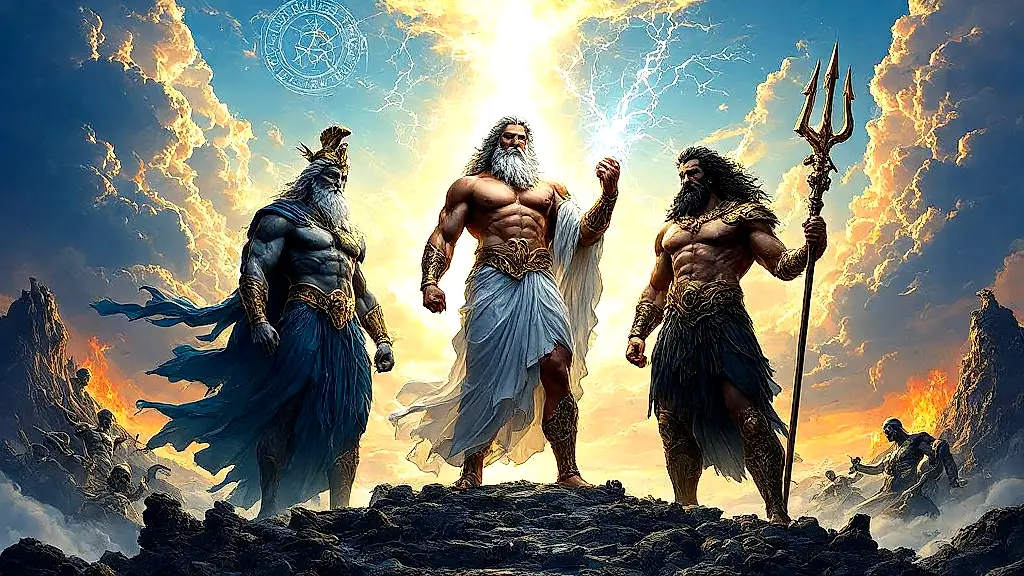
| Brother | Domain | Symbols | Key Powers | Notable Myth |
|---|---|---|---|---|
| Zeus | Sky and Heavens | Thunderbolt, Eagle | Controlled weather, God’s laws | Decided mortal disputes |
| Poseidon | Seas | Trident, Horse | Caused earthquakes, Made storms | Made freshwater springs |
| Hades | Underworld | Helm of Darkness, Cerberus | Ruled the dead, Controlled wealth | Story of Persephone |
Note: Some local traditions put Hades’ kingdom in different places, and Poseidon was also connected to freshwater in some areas.
The Titanomachy: Zeus’s First Big Win
The Titanomachy was the biggest divine war in Greek myths. This ten-year conflict (some say it lasted longer) had Zeus and his Olympian brothers fighting against Cronus and the Titans. This was like a revolution, with gods fighting instead of humans, using powerful earthquakes as weapons.
According to Hesiod’s Theogony, the Titans had the upper hand at first since they controlled the earth itself, while Zeus’s side was outnumbered and had no special weapons. Everything was on the line – the winners would rule the universe. What changed everything was when Zeus freed the Cyclopes and Hecatoncheires (Hundred-Handed Ones) from Tartarus.
The Cyclopes made Zeus’s lightning bolt, which became his most powerful weapon. Meanwhile, the Hecatoncheires threw hundreds of boulders at once. Apollodorus wrote how Zeus’s army finally attacked Mount Othrys, where the Titans were based. The fighting was so intense that some say it created the Mediterranean Sea where their blood fell.
Important Titans like Atlas got special punishments, showing how Zeus would punish others later. After the war ended, the defeated Titans were locked in Tartarus with the Hecatoncheires as guards. This victory made Zeus the supreme ruler and created the Olympian system we know. Interestingly enough, not all Titans fought against Zeus – Themis and Prometheus actually helped him, proving this wasn’t just a fight between generations.
The Titanomachy’s effects lasted through later myths, with other gods sometimes questioning Zeus’s power. Note: Some local stories, like those from Crete, said the war only lasted nine years or happened in different places.
Zeus’s Rule and What Showed His Strength
After winning his throne in the Titanomachy, Zeus faced an even bigger challenge. He had to prove he was the true ruler of all gods. To show his power was absolute, he used clear signs and impressive acts of godly power that everyone could see.
Ruler of the Sky and Thunder
As ruler of the heavens, Zeus controlled all the weather patterns across the world. People believed thunder was Zeus’s voice and lightning showed his direct action. Homer’s Iliad describes how he could create storms whenever he wanted or make the skies clear instantly, which made people respect and fear him.
What’s interesting is that some local groups, like those in Dodona, mainly worshipped Zeus as a wind god, showing local differences in how people saw his power.
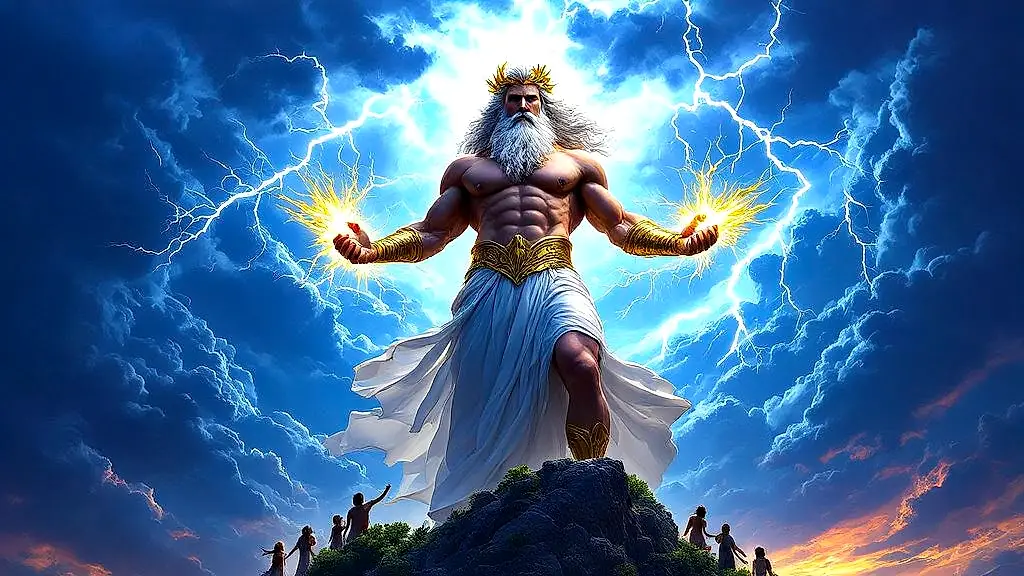
Zeus’s authority was shown through four main symbols that appeared often in Greek art and stories:
- Thunderbolt: Made by the Cyclopes during the Titanomachy, which he used as both a weapon and sign of power
- Eagle: His sacred bird that carried lightning and took Ganymede to Olympus
- Oak Tree: Holy at the Dodona oracle, that represented strength and lasting power
- Aegis: A special goatskin shield that created storms when moved
Note: Some vase paintings show Zeus with a regular staff instead of thunderbolts, showing artists sometimes changed details.
The Oracle of Dodona: How Zeus Spoke to Mortals
Herodotus wrote that this was Greece’s first oracle. At Dodona, people went to get answers from Zeus, where messages came from the sound of leaves moving in a sacred oak grove in Epirus. The Selloi priests – who didn’t wear shoes and slept on the ground – listened to these sounds along with bronze vessels that hung from the trees, which gave them multiple ways to understand the messages.
What made this place special was its direct link to Zeus’s power. Visitors believed the wind moving the leaves was Zeus himself speaking, and if a storm came over the grove, they saw this as very important signs. We know this because archaeologists found evidence the site was used as early as 2000 BCE.
Over time, buildings like a temple complex were added, turning it into one of the ancient world’s major religious sites.
The Dodona oracle let people hear Zeus’s messages through rustling oak leaves and hanging bronze vessels, with priests interpreting these signs as direct words from the god.
Zeus and Other Gods: Who Was Really in Charge?
Zeus’s oracles and symbols proved he was the top god. But even as king of gods, he had problems – other Olympians challenged him, and some rules even he couldn’t change. These godly arguments show the interesting boundaries to what Zeus could actually control.
Zeus and the Fates: Even He Had Limits
The Moirai (Fates) were the only power that controlled how things happened in the universe – even Zeus couldn’t change what they decided. According to Hesiod’s Theogony, the three sisters – Clotho who spun, Lachesis who measured, and Atropos who cut – decided how long everyone lived, from regular people to the gods themselves.
What’s important is that some stories say they were children of Nyx (Night), which made them older than Zeus and explains why even he had to listen to them. This meant even the king of gods had to follow destiny’s rules instead of changing them. For example, in Homer’s Iliad, Zeus thinks about saving his son Sarpedon from dying in battle.
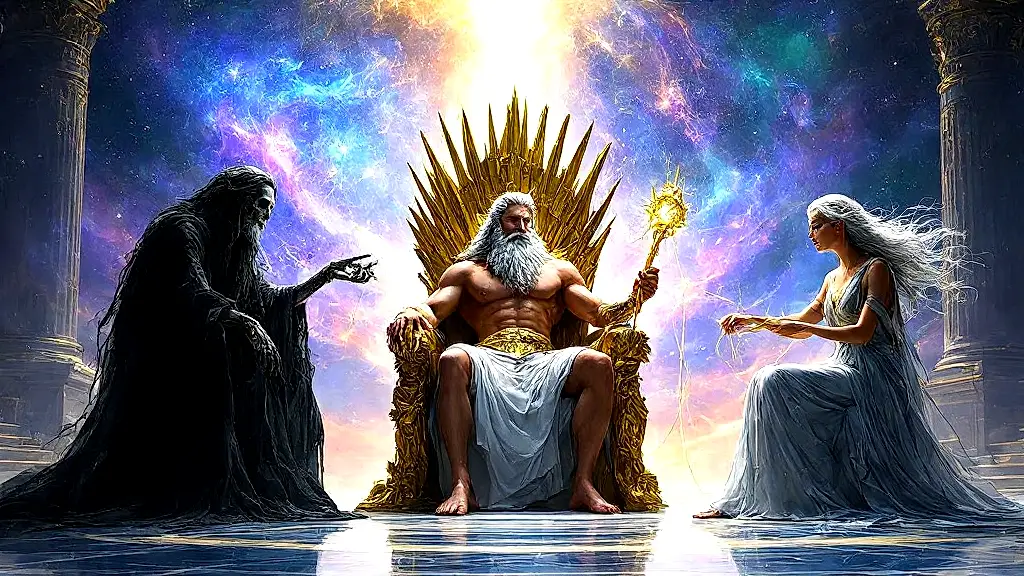
But Hera tells him this would mess up how things worked, which made Zeus let his son die (Book 16, lines 433-461). The same thing happened with Achilles – Zeus couldn’t stop his death at Troy even though he liked him. Some local stories even show the Fates sitting next to Zeus’s throne as his advisors, proving they helped keep the rules that even gods had to follow.
Clashes with Hera and Poseidon
Zeus and Hera weren’t married for love – they were always fighting for power. Hera usually used clever plans instead of strength when she went against Zeus. One time in the Iliad (1.396-406), she got other gods to tie up Zeus while he slept. When he woke up, he punished her by hanging her from Olympus with golden chains.
She also made constant trouble for Zeus’s children from other relationships, especially Heracles – Apollodorus says she even drove him mad. Some stories say Zeus removed Hera from her throne for a while before they made up, showing their fights sometimes got serious enough to affect everything. Unlike Hera, Poseidon was different because he had nearly as much raw power as Zeus.
The sea god once competed with Athena to be the protector of Athens (Pausanias 1.24.5). When he hit the Acropolis with his trident, he made a saltwater spring – this directly questioned Zeus’s decisions about godly arguments.
During the Trojan War (Iliad 13.354-360), Poseidon openly went against Zeus’s command to stay out of it, secretly helping the Greeks until Zeus threatened to use much stronger power. These fights show Zeus stayed in charge by being strong, punishing carefully, and sometimes making deals with his powerful brothers and sisters.
Stories That Proved Zeus Was the Strongest
People sometimes questioned Zeus’s power. But in important battles, he showed no one could match his strength when he needed to prove it. These events proved he was the strongest Olympian.
The Gigantomachy: Crushing the Giants
The Gigantomachy was Zeus’s biggest challenge – a huge battle against the Giants, dangerous creatures that Gaia (Earth) created to get revenge for the Titans’ loss. This was like a complete change in who ruled the world. According to Hesiod (Theogony 185-186), these beings were tough enemies. Some stories say they had snake legs and could only be defeated if gods and humans worked together.
The Oracle at Delphi had predicted the Olympians would need a human hero to win, which is why Hercules became so important. Zeus played the key part, using his famous thunderbolt with powerful strikes. Apollodorus (Library 1.6.1-2) writes how Zeus killed Porphyrion, the leader of the Giants, after he tried to attack Hera. Other versions tell about Zeus fighting Alcyoneus, who couldn’t die but only in his home area of Pallene.
Zeus had Hercules pull him out of that area to defeat him. This battle mattered so much that Greeks later showed it on the Pergamon Altar, with Zeus’s win showing order defeating disorder. What’s special about this fight is that the gods needed help from humans. Hercules‘ arrows, poisoned with Hydra venom, worked best against Giants like Alcyoneus and Pallas.
Some local stories even say Athena later wore Pallas’s skin as her armor. This war set up an important rule: while Zeus had incredible power, he often required human allies to make prophecies come true and keep the world in balance.
Punishing Prometheus: What Happened When You Defied Zeus
When the Titan Prometheus (“Forethinker”) stole fire from Olympus for humans, he did the biggest thing anyone could do to challenge Zeus’s power. The fire meant more than heat – in Hesiod’s Works and Days (42-58), it stood for godly knowledge and skills that Zeus didn’t want humans to have. Zeus responded with a clever but cruel punishment: he made Hephaestus chain Prometheus to Mount Caucasus, where an eagle ate his liver every day.
Since his liver grew back each night, the pain never ended. This wasn’t just torture – it was like a warning to all gods about crossing Zeus. But the story also shows Zeus wasn’t simple. According to Aeschylus’ Prometheus Bound, the Titan knew a secret that could threaten Zeus’s rule. After suffering for hundreds of years, Prometheus finally told Zeus this secret.
In the end, Hercules freed Prometheus because Zeus wanted him to. Some stories say Prometheus then made the first woman, Pandora, as part of making things right. This whole story shows Zeus could be angry but also practical – while he wouldn’t accept being challenged, he knew when to make deals to keep his power.
The Flood of Deucalion: Zeus’s Anger at Humans
Zeus became completely fed up with how bad humans acted. According to Ovid’s Metamorphoses (1.253-312), King Lycaon of Arcadia made him especially angry by serving human flesh as food – the last bad thing in a long list of human crimes. Zeus sent heavy rains for nine days and nights, covering whole cities with water and wiping everything away.
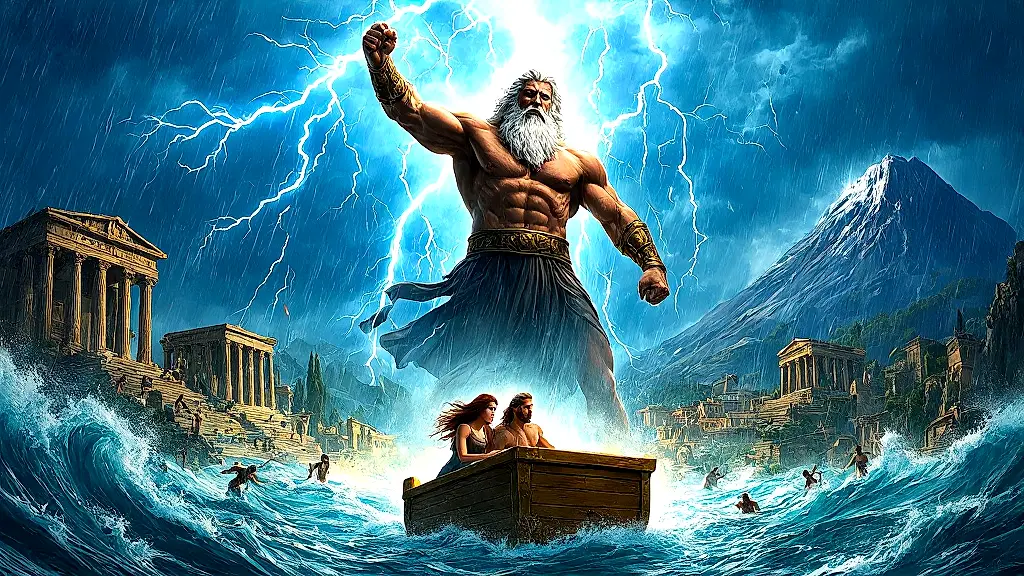
Only Deucalion (Prometheus’s son) and his wife Pyrrha survived, because Prometheus warned them and they stayed safe in a chest that floated to the top of Mount Parnassus. What happened next showed Zeus’s contradictory side. While he destroyed nearly everyone, he also let humans start again. Apollodorus (Library 1.7.2) tells how Deucalion and Pyrrha made new people by throwing stones behind them.
These stones came from Gaia (Earth), called “the bones of their mother,” and turned into humans. This special way to make new people kept Zeus’s world in balance while showing he could be merciful sometimes. The flood story works both as a warning and an explanation of how Zeus would step in when humans went too far, but still let good people exist.
Zeus wiped out nearly all humans with a flood for their wickedness but let two survivors, Deucalion and Pyrrha, start humanity again by throwing stones that turned into people.
Honoring Zeus and His Lasting Mark
People didn’t just fear Zeus’s power – they deeply respected it. He made people worship him with great respect throughout Greece. His effect on Greek religion lasted hundreds of years, seen in everything from huge temples to small village shrines.
The Temple of Olympia Zeus: A Tribute to His Might
The Temple of Zeus at Olympia was the greatest physical demonstration of Zeus’s power. Inside stood Phidias’ famous statue, made of gold and ivory, which became one of the Seven Wonders of the Ancient World. Pausanias (Description of Greece 5.11.1-10) wrote about this huge statue that showed Zeus sitting on his throne.
In his right hand he held a statue of Nike (Victory), while his left hand gripped a scepter. Artists decorated it carefully with ebony, gold and precious stones. The building was an excellent example of Doric style architecture, with 6 columns in front and 13 along the sides. Its triangular pediments had carvings that showed Zeus watching over the Olympic Games, the athletic contests Greeks held every four years to honor him.
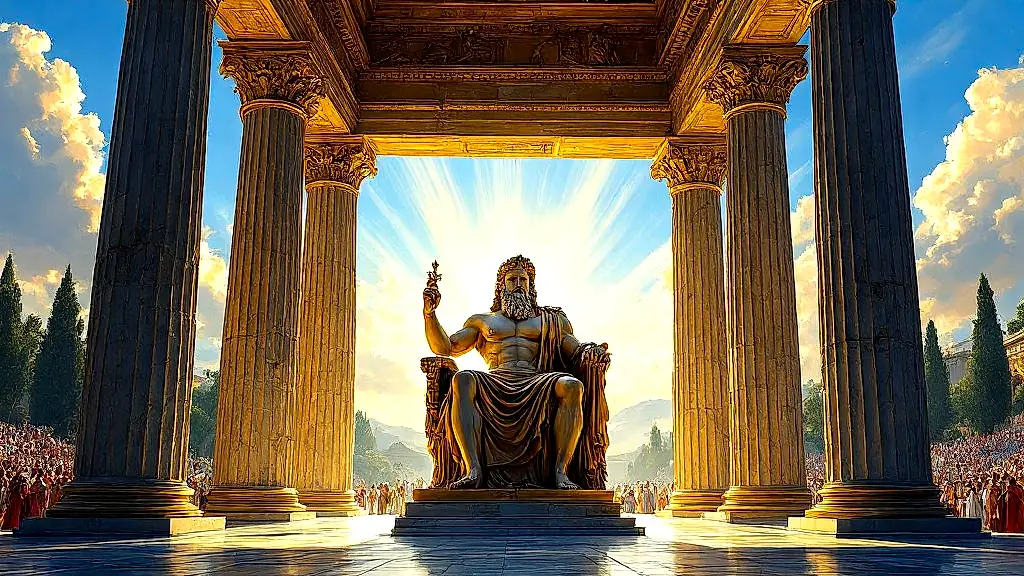
When Roman emperor Theodosius I outlawed Greek religious practices in 426 CE, the temple was destroyed. But its influence remained as the best example of how the ancient Greeks imagined their most powerful god.
Zeus in Local Beliefs
Ancient Greeks worshipped Zeus using different local names called cult epithets, which showed his various jobs in their lives. These weren’t simple titles – they showed how various areas connected with their main god, similar to how people today might use different titles for the same person in different situations.
Pausanias wrote about more than 50 such names, including the strict Zeus Horkios (oath keeper) who punished liars and the kind Zeus Philios (friend protector) who looked after relationships.
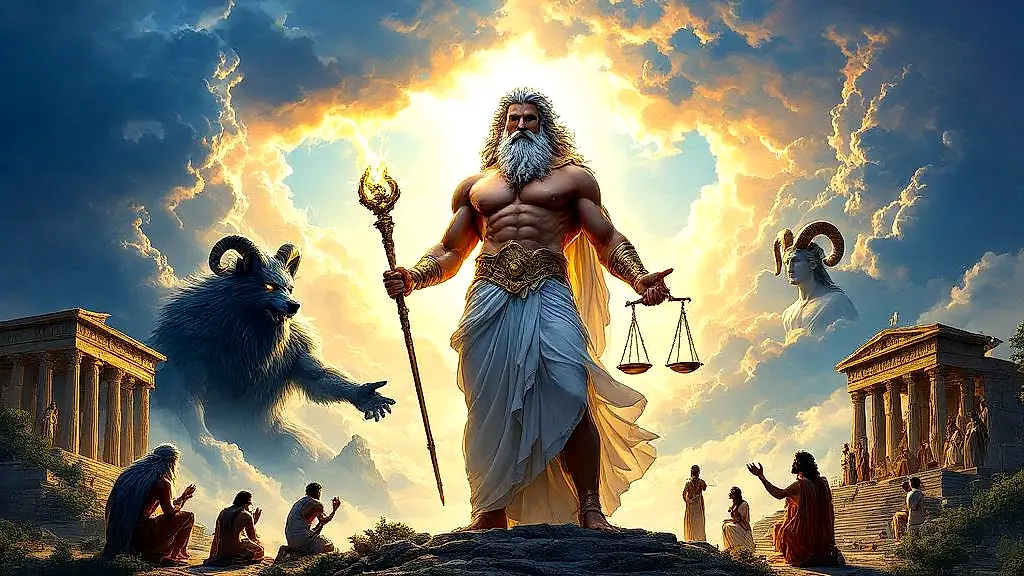
Some important local versions included:
- Zeus Xenios: Protected travelers and enforced rules about treating guests well
- Zeus Areius: The war-like version that Spartans prayed to before fights
- Zeus Meilichios: Shown as a snake, this “Kindly One” brought wealth to homes
- Zeus Ktesios: Guarded family possessions, with small altars in Athenian houses
These local names prove that while Zeus always remained king of the gods, people worshipped him differently depending on what they needed. The Zeus Lykaios of Arcadia connected to wolf legends, while Zeus Ammon blended Greek and Egyptian beliefs. Each name shows another way Greeks understood their religion while keeping Zeus’s main identity unchanged.
FAQs
1. Could Zeus Defeat Odin in Battle?
Zeus could defeat Odin in battle due to his uncontested sovereignty over fate, unlike Odin’s inevitable doom in Ragnarök prophecies.
2. Why Did Zeus Fear Nyx?
Zeus feared Nyx because she was a primordial deity older and more powerful than the Olympians, commanding respect even from the king of gods.
3. Was Zeus Truly Immortal?
Zeus was truly immortal in the sense that he could not die, though he could be temporarily overpowered or imprisoned.
4. Who Could Challenge Zeus’s Rule?
Zeus’s rule was seriously challenged only by Typhon and the Giants, though both were ultimately defeated.

